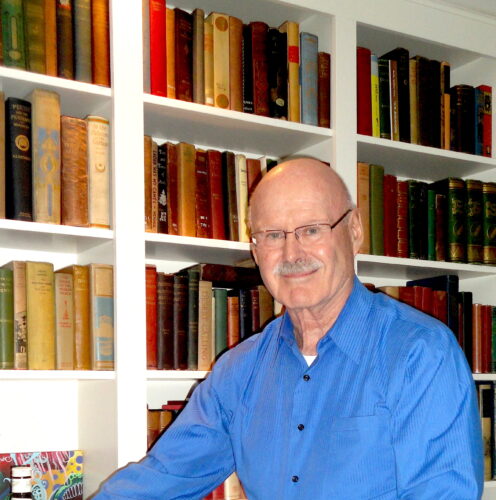
Mountains near Sana’a, Yemen, 1992. (motohakone, Flickr, CC BY-NC-SA 2.0)
By As`ad AbuKhalil
Special to Consortium News
 The world of academia has lost Michael C. Hudson, a noted expert on the Arab world, who died on May 25. In a long career, Hudson challenged key Western misconceptions about the Arabs and their politics and pushed against Zionist influence in the academe. He was a co-founder, with Hisham Sharabi, of the important Center for Contemporary Arab Studies at Georgetown University.
The world of academia has lost Michael C. Hudson, a noted expert on the Arab world, who died on May 25. In a long career, Hudson challenged key Western misconceptions about the Arabs and their politics and pushed against Zionist influence in the academe. He was a co-founder, with Hisham Sharabi, of the important Center for Contemporary Arab Studies at Georgetown University.
Born in 1938 in New Haven, Connecticut, Hudson was educated at Swarthmore College before studying under Karl W. Deutsch at Yale University. He wrote his PhD dissertation on political modernization in Lebanon, and the dissertation was published in a book in 1968, titled: The Precarious Republic: Political Modernization in Lebanon.
The book was very-well received in the scholarly community and it became a sensation in 1975, when the civil war broke out in Lebanon — a civil war that would last for 15 years.
Hudson stood out (along with Syrian sociologist, Halim Barakat) among Western and Eastern academics in deviating from the rosy assessments of the Lebanese political system before 1975. He concluded his landmark work by observing: “At the risk of underestimating the Lebanese ingenuity, it must be concluded that the Republic’s political future will be stormy” (p. 331).

Michael C. Hudson in his library in 2011. (Rbkhoury, CC BY-SA 3.0, Wikimedia Commons)
In 1973, a Lebanese political scientist, Elie Salem, would title his study of Lebanon “Modernization without Revolution.” Lebanon was for most political scientists a political success story. Hudson was able, a full seven years before the civil war, to predict the potential turbulence awaiting the Lebanese Republic and its people.
Hudson discovered his love for the Middle East in 1958 when he was an exchange student in Beirut during the U.S. Marines intervention. He would later study Arabic and devote his career to the study of the Arab world.
His first teaching job was at Brooklyn College of the City University of New York and he then taught at the School for Advanced International Studies, at Johns Hopkins University. Hudson then joined the School of Foreign Service at Georgetown University and would stay there until 2012 when he accepted a position at the University of Singapore, where he founded a Middle East center.
The Georgetown Center
Hudson collaborated with Sharabi in creating a radical alternative to Middle East studies in the U.S. Sharabi, fresh out of his post-1967 radicalization, joined with Hudson to create the Center for Contemporary Arab Studies at Georgetown in 1975. The very creation of the center, and its name, was a direct challenge to Orientalist centers for Middle East studies in the U.S. and Europe.
First, the center regarded the Arab world as one political unit, when the U.S. (government, media and academia) fought all manifestations of Arab nationalism and refused to accept the legitimacy of the Arab nationalist project, or even its political existence.
For the U.S. and Western endorsers of Zionism, a geographic Middle East unit that does not accept the existence of the Israeli political entity with in it can’t be legitimate. The U.S. was — along with its despotic allies in the Gulf — an avowed enemy of Arab nationalism and pushed back against all Arab nationalist projects and ideas.
The Center for Arab Studies at Georgetown was a brave academic recognition of the political salience of analysis of the Arab political unit. (There is today another Arab Studies Center at the University of Houston).
Furthermore, the center at Georgetown focused on the contemporary study of the Arab world. Other Middle East (or Near East) studies focused on the ancient world and the historical region. And as Edward Said observed in Orientalism, evidence drawn from historical ancient realities and holy texts was preferable (to most Orientalists) to evidence drawn from modern realities in analyzing Arab politics.
The center, as envisioned by Sharabi and Hudson, was to challenge the Orientalist assumptions and to regard data from the present-day Arab world as essential to understanding its politics. This sounds axiomatic but it was not easy to push against centuries of Orientalist dogma.
Sharabi and Hudson also tapped a different political atmosphere in the U.S. capital at a time when Gulf countries — unlike today — were at odds with the Israel lobby and believed in the need for an alternative Arab lobby. Sharabi was key — along with the very supportive dean of the School of Foreign Service, Peter Krough — in fundraising throughout the Arab world. The Gulf monarchies’ position was sufficiently different then that the center’s academic chair, which the late Marxist historian Hanna Batatu occupied, was named after the Kuwaiti minister of defense and Hudson’s chair was named after a UAE diplomat.
But when Moammar Qadhdhafi of Libya offered to fund the Omar Al-Mukhtar chair for Sharabi, the Georgetown administration balked after the Zionist lobby went into action. A huge media campaign was organized against the center and the money was subsequently refused.
The center hired faculty from different disciplines to teach contemporary Arab politics and society. Halim Barakat (the Syrian-Lebanese professor and novelist) was an early recruit (he was expelled from the American University of Beirut due to a vicious campaign undertaken by the right-wing professors Charles Malek and Samir Khalaf). Moreover, for the center’s students, Arabic instruction deviated from the Orientalist tradition of reading old texts (holy and literary); instead, the teaching of everyday Arabic (and newspaper Arabic) was emphasized.
Hudson followed the Precarious Republic with another landmark work in 1977, titled Arab Politics: The Search for Legitimacy. In that book, Hudson, yet again, challenged conventional Western academic wisdom and asserted that the paradigms of comparative politics apply to Arab politics, which need not be reduced to stereotypes and references to the bizarreness of the people and their culture.
Legitimacy of Arab Regimes
Hudson, using the paradigm of legitimacy, persuasively argued that while democracy is weak in the region, there are other resources of legitimacy that governments draw upon. He created a typology of Arab regimes and refuted the notion of uniformity of Arab politics and society. Hudson showed that political conditions varied from one Arab country to another and that rulers don’t resort to the same mechanisms in maintaining rule. Hudson basically argued that Arab public opinion matters and that even tyrannical rulers have to take it into consideration.
Under Hudson’s leadership the center grew in stature and attracted students and scholars from around the world. In the years that I was a student at the government department (and later when I taught at the center) I was impressed with the diversity of the student body. Hudson insisted on maintaining high academic standards and clashed with colleagues over that.

Georgetown University in Washington, D.C., from across the Potomac River. (Mario Roberto Durán Ortiz, CC BY-SA 3.0, Wikimedia Commons)
He traveled widely in the Arab world and knew leaders in government and opposition: from Saeb Salam to George Habash, from Hasan Turabi to King Husssein. He practiced true Arab nationalism by making a point of traveling to all Arab countries, except Djibouti. I would often tease him that he had to make the Djibouti trip. He thought that southern Yemen was the most beautiful part of the region.
In 2000, after the humiliating Israeli withdrawal from Lebanon, I went with Michael and my sister, Mirvat, on a tour of South Lebanon, visiting the entire area from which the Israeli enemy army fled. He held a gigantic map and was locating every city, village and town along the way. He wanted to stop at almost every village despite my constant complaints about motion sickness. I was amazed during the trip how Michael did not lose any of his interest in the region and care for its people.
I once took a seminar on international relations in the Arab world with Adel Al-Jubeir, former Saudi foreign minister and current minister of state for foreign affairs. Hudson was a very mild-mannered person who was not given to temper tantrums or curtness. But once after a presentation by Al-Jubeir about something related to Saudi Arabia, Hudson had to gently remind him that this was an academic setting and not a platform for governments. Another time, after one of my many heated exchanges with Jubeir, Hudson took me aside after class and asked me to go easy on him.
Hudson was instrumental in holding the annual symposia of the center, which attracted scholars from around the Arab world. He also was an early champion of women’s rights and the study of women in the region. The center’s female academics and regular conference speakers were rare in the Washington, D.C., of the 1980s. Those symposia also brought together academics from the West and from the East, and that was rare at the time (and still is rare in most U.S. university conferences).
Hudson (who served as president of the Middle East Studies Association) was one of the most influential Western academics on the region, and he lectured on the Arab world worldwide. His imprint on Middle East studies was big, and was felt when he retired from Georgetown in 2012.
After the passing of Sharabi, Batatu, Irfan Shahid, Halim Barakat, Barbara Stowasser and Hudson, the center at Georgetown lost much of its luster and appeal; it is not the academic draw that it once was. The current director, Joseph Sassoon, is not even known in the Arab world. He recently refused to sign a statement in support of Palestine, after it was signed by most of the faculty and staff of the center. The current administration at Georgetown was more than happy to end the traditional support for the center because it caused plenty of criticism and hostility from AIPAC.
After I received my PhD from Georgetown in 1988 (and Michael served as my dissertation adviser), he asked me about my plans. I said: I don’t have any plans. He asked: what about teaching? I said: I don’t think I would like it. He asked: have you ever tried it? I said: no. He said: here is a course on Arab politics: why don’t you teach it and see? And on the very first day of class, I discovered my calling and my career. I remember walking home and saying: teaching, teaching. For that — and for much more — I feel indebted to Michael C Hudson.
As`ad AbuKhalil is a Lebanese-American professor of political science at California State University, Stanislaus. He is the author of the Historical Dictionary of Lebanon (1998), Bin Laden, Islam and America’s New War on Terrorism (2002) and The Battle for Saudi Arabia (2004). He tweets as @asadabukhalil
The views expressed are solely those of the author and may or may not reflect those of Consortium News.


This was a very nice tribute to someone who made a positive impact on your life. Thank you for sharing it.
Lovely, lovely, lovely. Absolutely lovely.
Great to read this. I always love reading As`ad AbuKhalil.